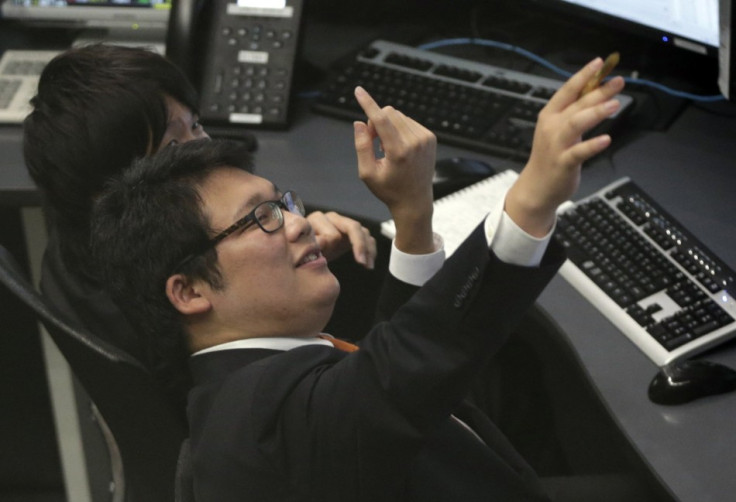Asian Markets Gain on Positive Europe and China Manufacturing Data

Asian markets traded higher on Tuesday after positive factory activity data from Europe and China raised hopes of a quicker global economic recovery.
The Japanese Nikkei finished 2.99% higher or 405.52 points at 13,978.44.
Australia's S&P/ASX finished 0.16% higher or 8.30 points at 5,196.60.
South Korea's Kospi finished 0.46% higher or 8.93 points at 1,933.74.
Hong Kong's Hang Seng was trading 1.10% higher or 242.91 points to 22,418.25.
The Shanghai Composite was trading 1.04% higher or 21.61 points to 2,120.06.
The eurozone's manufacturing sector continued to expand in August as member countries such as Germany, the Netherlands, Italy, Austria and Ireland showed improved growth, largely indicating a broad-based recovery. The Markit Eurozone manufacturing purchasing managers' index (PMI) rose to a 26-month high at 51.4 in August from 50.3 in July. Economists expected a reading of 51.3 for the month.
Elsewhere, China's manufacturing sector recovered in August as it posted an expansion in activity following three months of deterioration, thanks to the stimulus measures announced by the government. The HSBC manufacturing purchasing managers' index (PMI) showed a final reading of 50.1 in August, up from an 11-month low of 47.7 in July. The reading, however, slightly missed economists' expectations of 50.2.
In Australia, the country's central bank left its cash rate at a record low of 2.5% on Tuesday.
"The Board will continue to assess the outlook and adjust policy as needed to foster sustainable growth in demand and inflation outcomes consistent with the target," Reserve Bank of Australia Governor Glenn Stevens said in a statement.
Australians will elect a new government later this week.
Wall Street Closed
Asian markets took their cues from Europe as financial markets in the US were closed on Monday for the Labour Day holiday.
Company Stock Movements
In Tokyo, Utility firm Tokyo Electric Power (Tepco) jumped over 5% after the government pledged to spend close to $500m to clean up the polluted Fukushima Daiichi nuclear power plant.
Mitsubishi UFJ gained over 5% while gaming major Nintendo added 5%.
Fast Retailing added over 3% ahead of reporting August sales for its Uniqlo clothing brand.
Automakers Toyota Motor and Nissan added 3% each, while Mizuho moved up 2%.
Toyota Motor added 2.8% while rival Honda Motor gained 2%.
In Shanghai, real estate developer Shanghai Shimao added 2% while rival Vanke gained 1.4% on news that mainland home prices rose 8.6% year-on-year in August.
Environmental stocks also climbed after Beijing unveiled another raft of measures to curb pollution, such as limiting the number of new vehicles on the roads.
Beijing Capital added over 2% while Tianjin Capital moved up 1% after China rolled out measures, such as limiting the number of new vehicles on roads, to curb pollution.
Brokerage firm Everbright Securities lost 1% on news it could face additional losses of $436mas investors sought compensation for last month's trading glitch.
On 16 August, a two-minute trading glitch at Everbright set off some 26,000 erroneous buy orders to the Shanghai Stock Exchange (SSE). The trades, worth 23.4bn yuan (£2.45bn, €2.86bn, $3.82bn), fuelled a rally on the SSE. China's stock markets regulator said it would examine stock trading software in use across the country's brokerages after the incident.
In Sydney, iron ore miner Fortescue Metals shot up 4.5% while rival Rio Tinto gained 2.7% after iron ore prices rose overnight.
Woolworths, Australia's largest retailer, and Wesfarmers, Australia's largest employer, lost over 1% each on news that retail sales growth was lower-than-expected in July.
In Seoul, STX Offshore and Shipbuilding rallied 12% while Hyundai Mipo Dockyard shot up 5%.
Auto parts maker Hyundai Mobis lost over 2%. Kia Motor and part owner Hyundai Motor lost over 1% each on news that Hyundai's workers could go on a strike this week as well. Hyundai's union is demanding higher wages and several rounds of negotiations with the management have failed so far.
© Copyright IBTimes 2025. All rights reserved.






















